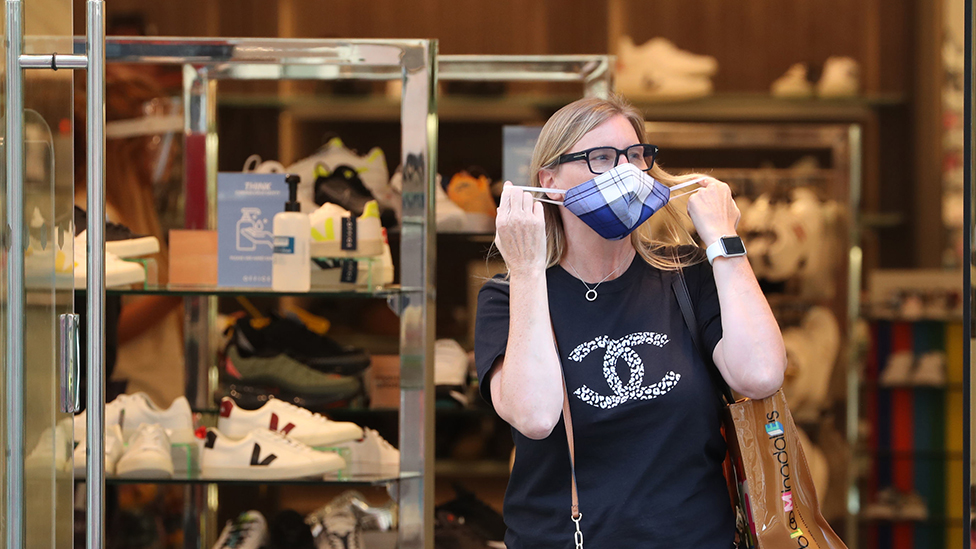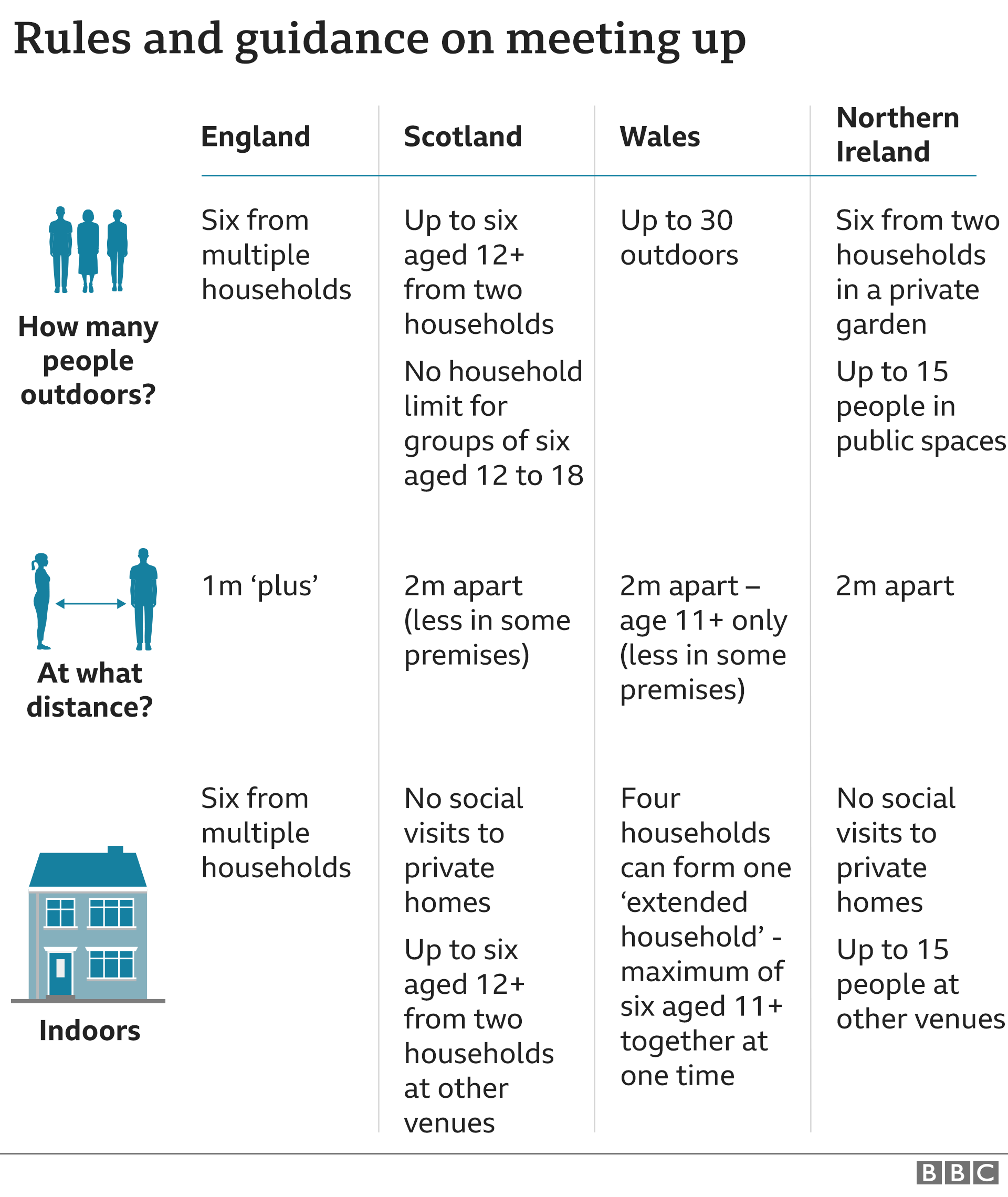What are the restrictions in the different tiers?
Tier 1 – Medium
- 10pm curfew for bars, pubs and restaurants
- Gatherings of more than six people banned, apart from some settings such as funerals and weddings
Tier 2 – High:
- Mixing of households indoors not allowed
- Two households can meet in a private garden – rule of six and social distancing rules apply
Areas with the lowest rates of infection will be placed in Tier One. They will face the basic national rules currently in force including:
- Pubs, bars and restaurants will have to close at 22:00 BST
- The rule of six (number of people who can meet up) applies both indoors and outdoors
Areas in Tier Two face an extra level of restrictions:
- No mixing between different households indoors
- The rule of six only continues outdoors
Most areas of England which are already subject to local restrictions will be placed in Tier Two – although some places will face additional restrictions for the first time.
Tier 3–Highest:
The highest level of restrictions are in Tier Three. Areas where transmission is rising most rapidly will be placed in this category.
The government said it would work with local councils on the additional measures for each area. The prime minister said the Liverpool City Region (Liverpool, Knowsley, Sefton, Wirral, St Helens and Halton) – currently the only area facing Tier Three restrictions – will have the following restrictions from Wednesday 14 October:
- Pubs and bars will be closed, except where serving substantial meals
- Households cannot mix indoors or outdoors
- Gyms, leisure centres, betting shops and casinos will also close
- Shops, schools and universities will remain open
What are the current restrictions across Scotland?
Until Sunday 25 October, pubs and restaurants can only open inside between 06:00 and 18:00 daily, and they are not allowed to serve alcohol.
They are only allowed to serve food and non-alcoholic drinks, although they can serve alcohol outdoors until 22:00.
Hotel restaurants can serve food after 18:00, but only for residents and without alcohol.
Shops have reintroduced measures to ensure 2m (6ft) social distancing, such as one-way systems.
Face coverings are compulsory in indoor communal settings, such as staff canteens and corridors in workplaces.
Even tougher rules in the central belt
Because of higher levels of Covid infection, 3.4 million people in central Scotland are subject to tougher restrictions until 25 October.
The region affected covers 18 local council and five health board areas (Greater Glasgow & Clyde, Lanarkshire, Ayrshire & Arran, Lothian, Forth Valley).
In these areas, all licensed premises – with the exception of hotel bars for residents – have to close indoors and outdoors, though takeaways are permitted.
Cafes can stay open until 18:00 daily, as long as they don’t serve alcohol.
People living in these areas have been told to avoid public transport, unless absolutely necessary, and not to leave their local areas if possible (people from outside are encouraged not to visit).
Other measures include the closing of snooker halls, bowling alleys, casinos and bingo halls, the suspension of non-professional contact sports and indoor group exercise for adults.

What about meeting people away from pubs and restaurants?
Already in Scotland, you’re not allowed to meet inside other people’s homes.
Up to six people from two different households can meet outdoors, including in private gardens.
However, there’s no limit on the number of children under 12 who can meet or play together outdoors.
Young people aged 12 to 18 are exempt from the two-household limit and can meet outdoors in groups of up to six.
Ms Sturgeon has previously urged people not to book foreign trips during the October school holiday.
What are rules in Wales?
Pubs, cafes and restaurants in Wales have to stop serving alcohol at 22:00. Pubs are required to provide table service only.
Sales of alcohol from off-licences and supermarkets after 22:00 are also banned.
What are Northern Ireland’s new meeting up rules?
People in Northern Ireland can no longer meet anyone who they don’t live with inside their home. There are only limited exceptions.
Pubs, hotel bars and restaurants can stay open until 23:00.
Northern Ireland’s Deputy First Minister Michelle O’Neill has warned that .

Where are there local restrictions?
Even before the latest local restrictions in Scotland’s central belt, at least 17 million people across the UK were subject to additional restrictions – a quarter of the population (25.4%).
The nature and extent of these restrictions vary from place to place and you can check the rules in your area with our postcode checker here.
Support Independent Journalism Today
Our unwavering dedication is to provide you with unbiased news, diverse perspectives, and insightful opinions. We're on a mission to ensure that those in positions of power are held accountable for their actions, but we can't do it alone. Labour Heartlands is primarily funded by me, Paul Knaggs, and by the generous contributions of readers like you. Your donations keep us going and help us uphold the principles of independent journalism. Join us in our quest for truth, transparency, and accountability – donate today and be a part of our mission!
Like everyone else, we're facing challenges, and we need your help to stay online and continue providing crucial journalism. Every contribution, no matter how small, goes a long way in helping us thrive. By becoming one of our donors, you become a vital part of our mission to uncover the truth and uphold the values of democracy.
While we maintain our independence from political affiliations, we stand united against corruption, injustice, and the erosion of free speech, truth, and democracy. We believe in the power of accurate information in a democracy, and we consider facts non-negotiable.
Your support, no matter the amount, can make a significant impact. Together, we can make a difference and continue our journey toward a more informed and just society.
Thank you for supporting Labour Heartlands












